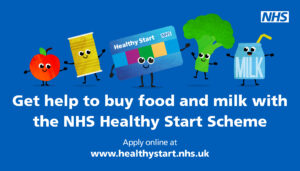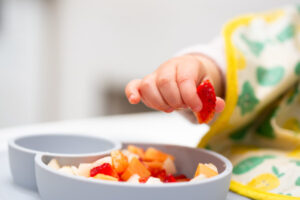 Your child will now be eating more regularly alongside their usual their breast or milk feeds. Start4life has expert NHS advice, helpful videos, tips from other parents, and lots of simple, healthy recipes and meal ideas.
Your child will now be eating more regularly alongside their usual their breast or milk feeds. Start4life has expert NHS advice, helpful videos, tips from other parents, and lots of simple, healthy recipes and meal ideas.
Children aged six months to five years should be given vitamin supplements containing vitamins A, C and D every day.
Milk feeds
Children can have full fat cow’s milk after their first birthday alongside family foods. Cow’s milk is much cheaper than follow on formula and also better for their teeth as it contains less sugar.
You can carry on breastfeeding your child into their first year and beyond if you want to. Beside You has some great information regarding breastfeeding and going back to work including your rights as a breastfeeding mother and how to continue to breastfeed, as well as information about breastfeeding older children and toddlers or getting ready to stop breastfeeding if you are ready.
Healthy Start
 If you are on certain benefits and are pregnant or have children under the age of four, you can claim Healthy Start vouchers. Find out if this applies to you at Healthy Start. These weekly vouchers can be used to buy milk, fruit and vegetables, pulses, and infant formula milk. You can also get vitamin supplements.
If you are on certain benefits and are pregnant or have children under the age of four, you can claim Healthy Start vouchers. Find out if this applies to you at Healthy Start. These weekly vouchers can be used to buy milk, fruit and vegetables, pulses, and infant formula milk. You can also get vitamin supplements.
 Supporting appropriate growth
Supporting appropriate growth
Your child’s weight and length will be measured and plotted on the growth charts at the back of their red book during their one-year development review. This gives you a good opportunity to discuss your child’s growth over their first year.
If your child is following their expected growth line, along their centile curved line and has plenty of energy then this tells you they are eating the right amount for them. Trust your child to know how much they need to eat and drink. If your child isn’t following their centile line, contact your local health visitor for support.
Kent health visitors and midwives have put together a video on how your baby's growth is monitored during their early years, why this is important and what support is available for you and your baby. Thank you to all the parents, children and colleagues at Kent Community Health Foundation Trust and East Kent University Foundation Trust for their help in creating this video.
Fussy eater? It is really common around the age of two, for children to develop some ‘fussy eating’ behaviours.
 They may like particular foods some days and not others, suddenly stop liking something altogether or be upset when things haven’t been prepared a certain way. This can be a frustrating time for parents but reassuringly, this is a normal phase of toddler development and will pass. If you find yourself in a battle of wills with your child at mealtimes then it is time to take a step back.
They may like particular foods some days and not others, suddenly stop liking something altogether or be upset when things haven’t been prepared a certain way. This can be a frustrating time for parents but reassuringly, this is a normal phase of toddler development and will pass. If you find yourself in a battle of wills with your child at mealtimes then it is time to take a step back.
Children pick up on your anxieties so the most important thing is to remain calm, and stick to the basics.
- Have regular meal and snack times, avoiding grazing between meals.
- Give water between meals.
- Sit down for meals and snacks with minimal distractions so that your child can focus on eating.
- Although it’s difficult trust your child to know how much or whether they eat what has been offered.
- Take uneaten food away without comment and try not to bribe, cajole, or get angry with your child to make them eat. Don’t offer an alternative.
- Reassure your child another meal or snack will be coming soon if they complain they are hungry. Try to stick to your regular meal and snack times.
- Make sure they are hungry, but not starving, before meals and allow them to eat to fully satisfy their appetite.
- Eat the same family meals together with your child as often as you can so they learn from you. If you want your kids to eat vegetables and drink water for example, they need to see you do it and enjoy it.
Kent Health Visiting Team and the Children’s Dietetics Team have made 'A parent and carer survival guide to feeding toddlers' with tips and strategies to navigate this phase and help your child develop a healthy diet lasting into adulthood.
Useful resources
- Start4life – expert NHS advice, helpful videos, tips from other parents, and lots of simple, healthy recipes and meal ideas.
- Child health clinics - Come along to a child health clinic for advice, information and support for you and your child's health and development from your local Health Visiting Team.

Looking for breastfeeding support?
No matter what stage of the breastfeeding journey you're in. Beside You is here to help every step of the way.